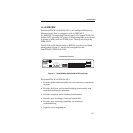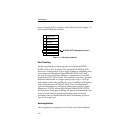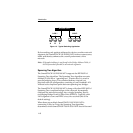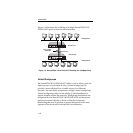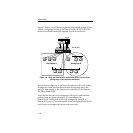
Introduction
1-11
packets to the LAN. If there is a cable break or a port failure, the
network topology is automatically reconfigured by the Spanning
Tree protocol to create an alternate path to the LAN.
1.5.2 SmartSTACK 100 ELS100-16TX Bridge Address
Table
The SmartSTACK 100 ELS100-16TX creates and maintains a
dynamic database of addresses called the Bridge Address Table.
The SmartSTACK 100 ELS100-16TX examines every packet to
determine its source address and LAN segment origin. It then
compares the source address and segment information it finds to
the entries in the Bridge Address Table.
If a packet’s address is not already stored in the Bridge Address
Table, the SmartSTACK 100 ELS100-16TX adds the learned
address, associated segment number, and a timer value indicating
the age of the observation. Consequently, the SmartSTACK 100
ELS100-16TX knows the address and associated segment number
the next time it sees that address. By using the information stored
in the Bridge Address Table, the SmartSTACK 100 ELS100-16TX is
able to quickly forward each packet to the correct LAN segment.
The SmartSTACK 100 ELS100-16TX learns addresses from all
packets, including data transmissions and “keep alive” packets
(packets sent by an idle station to let other stations know it is
present and functional). When devices are added to the network,
removed from it, or relocated, you do not have to reconfigure the
SmartSTACK 100 ELS100-16TX. The unit automatically learns new
device addresses, recognizes when a previously used address is
missing, or when a device has been moved to a new LAN segment.
An address stored in the Bridge Address Table is discarded if there
is no subsequent activity from that address after a configured
length of time (five minutes by default). This aging process ensures
that the Bridge Address Table is continually updated.
Addresses are continually added to and deleted from the Bridge
Address Table, reflecting the dynamic nature of internetwork
traffic.





